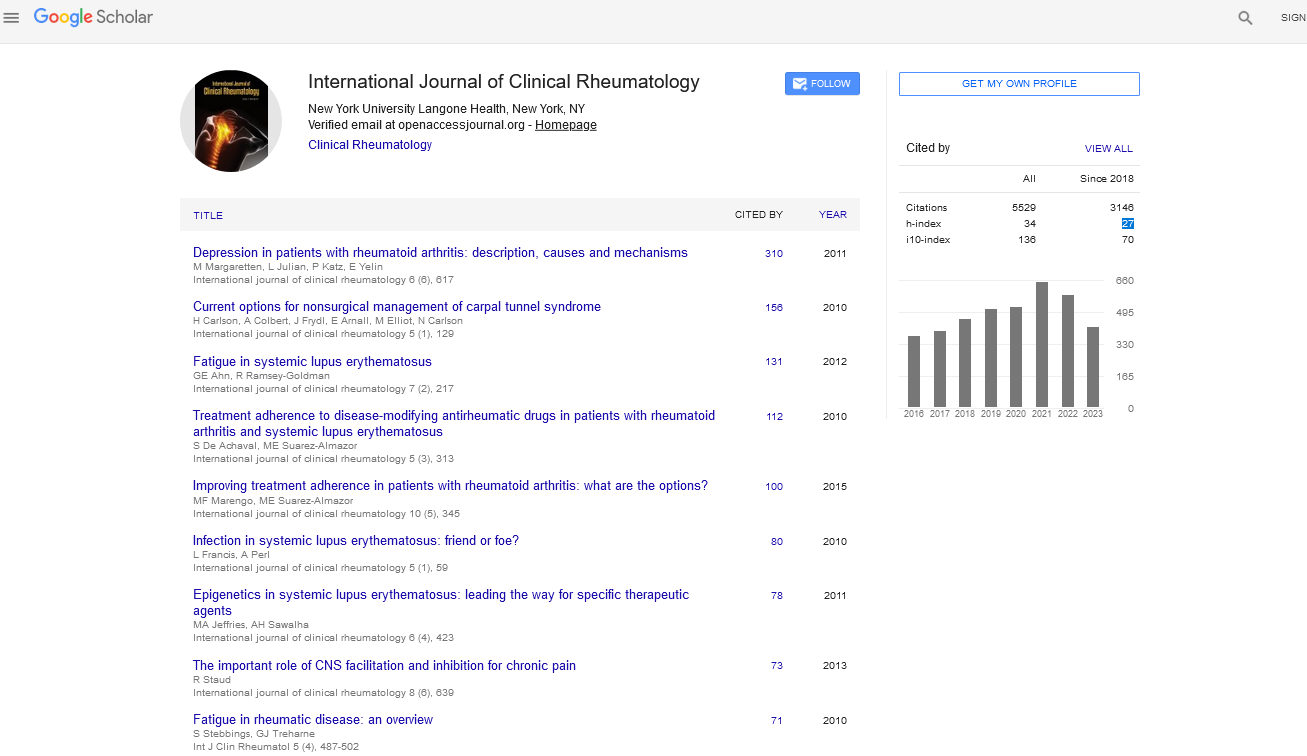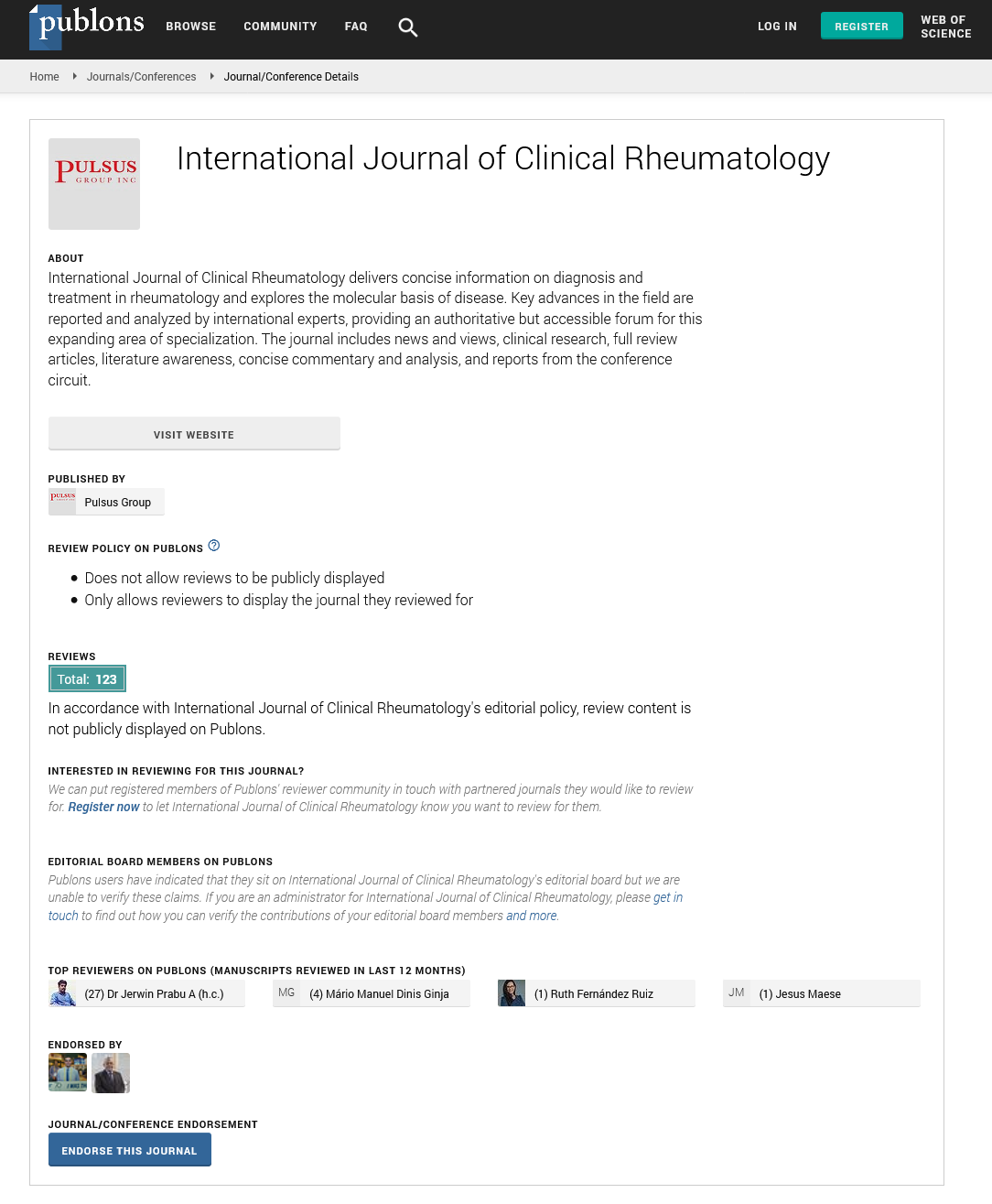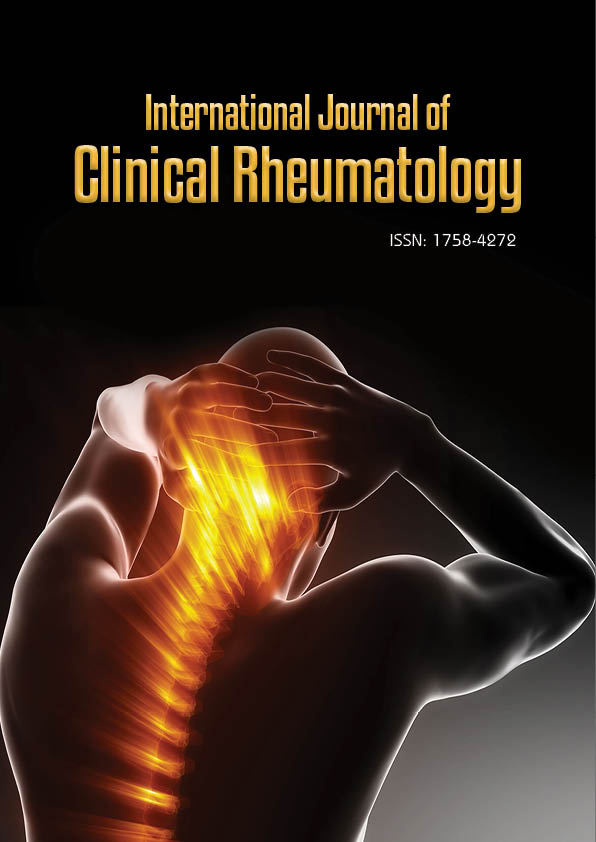Case Report - International Journal of Clinical Rheumatology (2017) Volume 12, Issue 1
Heart failure with preserved ejection fraction in rheumatoid arthritis and the role of interleukin-6 blockade
- Corresponding Author:
- Mohammed Omair
Division of Rheumatology, College of Medicine
King Saud University
Riyadh, Saudi Arabia
Tel: +966-1-467-1546
E-mail: momair@ksu.edu.sa
Abstract
There is growing evidence on the potential benefits of tocilizumab on the cardiovascular system in Rheumatoid Arthritis (RA) patients. We discuss a case of active RA and refractory Heart Failure with Preserved Ejection Fraction (HFpEF) that has shown dramatic improvement in her articular and cardiac symptoms. This report gives some evidence that tocilizumab could be safely used in RA patients with HFpEF and justify future research on interleukin-6 blockade in heart failure in general.
Keywords
rheumatoid arthritis, tocilizumab, heart failure with preserved ejection fraction
Learning objectives
Interleukin-6 is an important cytokine in the pathogenesis of rheumatoid arthritis and is elevated in patients with heart failure. Tocilizumab a blocker of interleukin-6 would be a potential target for patients suffering from both conditions.
Introduction
Rheumatoid Arthritis (RA) patients are at risk of developing cardiovascular diseases due to the high inflammatory burden that leads to accelerated atherosclerosis and increased morbidity and mortality [1]. Tumor necrosis factors alpha (TNF-α) is an important cytokine in the pathogenesis of both RA and heart failure [2]. Although TNF-α inhibitors (TNFIs) are safe and effective in the management RA [3], trials in heart failure were halted prematurely due to higher heart failure rate compared with placebo [4,5]. Concomitant heart failure can complicate the management of RA and TNFIs are not recommended in the presence of decompensation [6]. On the other hand, tocilizumab an interleukin-6 (IL-6) receptor blocker approved for the treatment of RA has not been associated with heart failure exacerbation. We here report an RA patient with recurrent heart failure exacerbation successfully treated with tocilizumab. This report complies with the case reporting guidelines [7].
Case
A 77 year lady with seropositive RA for 2 years, bronchiectasis, Hypertension (HTN) and history of heart failure started to follow up in our clinic in January 2013. She was initially started on Hydroxychloroquine (HCQ) 400 mg daily, Methotrexate (MTX) 12.5 mg weekly and prednisolone 5 mg daily. Later on, MTX was discontinued due to gastrointestinal intolerance. Other therapies included: furosemide 40 mg twice daily, isosorbide dinitrate 20 mg twice a day, amlodipine 5 mg daily, and pantoprazole 40 mg daily. Her condition remained unchanged with no history of decompensation.
On December 2013, her cardiac status has worsened which was manifested by progression of her New York Heart Association (NYHA) Functional Classification from 3 to 4 requiring hospital admission and intravenous diuretics. Her physical findings on each admission was classical for decompensated heart failure with bilateral inspiratory crackles, raised jugular venous pulse, ascites, sacral and pedal edema. There was no identifiable precipitating factor such as non-adherence, uncontrolled HTN, arrhythmia, new cardiac insult, infection or use of non-steroidal anti-inflammatory drugs. Laboratory investigations included: normal complete blood count, renal and liver function. Her echocardiogram revealed a normal left ventricular function with no valvular or pericardial abnormalities. She was discharged with an optimized medical therapy that included increasing furosemide to 80 mg twice daily and fluid restriction. These changes have led to partial symptomatic improvement and were followed by 6 other admissions due to heart failure decompensation between January 2014 and December 2104
On her last admission she developed a flare of her RA with an increase of her simplified disease activity index (SDAI) to 21. She was started on tocilizumab 8 mg/kg and a tapering regimen of corticosteroids. Over the next 10 months, the patient showed a dramatic response manifested by a drop of her SDAI to 10 and discontinuation of prednisolone and hydroxychloroquine. As of December 2016, she did not experience any further heart failure decompensation and her furosemide was successfully reduced to 40mg daily.
Discussion
IL-6 is a pleiotropic cytokine that plays a central role in the pathogenesis of RA and other autoimmune conditions [8]. Its level is also increased in the sera of patients with diastolic heart failure [2], predicts mortality [9,10] and observed decrease in its level correlates with improved diastolic function [2]. Liang et al. have reported that RA patients are at increased risk of developing diastolic dysfunction compared to the normal population. In their study, IL-6 level and disease duration were independent risk factors for developing diastolic dysfunction even after adjusting for other cardiovascular risk factors [11]. There is a growing body of evidence on the beneficial effect of tocilizumab on atherosclerosis and its biomarkers [12] leading to generation of the first RA trial having the time to occurrence of the first major cardiac events as the primary outcome (clinical trial.gov identifier: NCT01331837) but improving myocardial function (mainly systolic) was only revealed by limited reports of Castleman’s disease associated cardiomyopathy [13,14] and cardiac amyloidosis [15]. To the best of our knowledge, this is the first case report describing clinical improvement of HFpEF with tocilizumab without safety concerns. There is a need for trials evaluating the efficacy and safety of tocilizumab in HFpEF.
Conflict of Interest
Dr. Mohammed Omair declares: receiving honoraria/speakers fees/Advisory board from Pfizer, Abbvie, Bristol Myers Squibb and Hoffman-La Roche. Educational grant: Actelion, New Bridge, Bristol Myers Squibb and Hoffman-La Roche. Research grants: Pfizer. Other authors declare no conflict of interest.
References
- Puttevils D, De Vusser P, Geusens Pet al. Increased cardiovascular risk in patients with rheumatoid arthritis: an overview. Acta.Cardiol.69, 111–118 (2014).
- Wu CK, Lee JK, Chiang FTet al. Plasma levels of tumor necrosis factor–alpha and interleukin–6 are associated with diastolic heart failure through downregulation of sarcoplasmic reticulum Ca2+ ATPase. Crit. Care. Med. 39, 984–992 (2011).
- Aaltonen KJ, Virkki LM, Malmivaara A et al. Systematic review and meta–analysis of the efficacy and safety of existing TNF blocking agents in treatment of rheumatoid arthritis. PLoS.One.7, e30275 (2012).
- Mann DL, McMurray JJ, Packer M et al. Targeted anticytokine therapy in patients with chronic heart failure: results of the Randomized Etanercept Worldwide Evaluation (RENEWAL). Circulation.109, 1594–1602 (2004).
- Chung ES, Packer M, Lo KHet al. Randomized, double–blind, placebo–controlled, pilot trial of infliximab, a chimeric monoclonal antibody to tumor necrosis factor–alpha, in patients with moderate–to–severe heart failure: results of the anti–TNF Therapy Against Congestive Heart Failure (ATTACH) trial. Circulation.107, 3133–3140 (2003).
- Singh JA, Furst DE, Bharat Aet al. 2012 update of the 2008 American College of Rheumatology recommendations for the use of disease–modifying antirheumatic drugs and biologic agents in the treatment of rheumatoid arthritis. Arthritis.Care.Res. (Hoboken).64, 625–639 (2012).
- Gagnier JJ, Kienle G, Altman DGet al. The CARE guidelines: consensus–based clinical case reporting guideline development. BMJ.Case.Rep. (2013).
- Mihara M, Nishimoto N, Ohsugi Y. The therapy of autoimmune diseases by anti–interleukin–6 receptor antibody.Expert.Opin. Biol.Ther.5, 683–690 (2005).
- Miettinen KH, Lassus J, Harjola VP et al. Prognostic role of pro– and anti–inflammatory cytokines and their polymorphisms in acute decompensated heart failure. Eur. J. Heart. Fail.10, 396–403 (2008).
- Pan JP, Liu TY, Chiang SC et al. The value of plasma levels of tumor necrosis factor–alpha and interleukin–6 in predicting the severity and prognosis in patients with congestive heart failure. J. Chin.Med. Assoc. 67, 222–228 (2004).
- Liang KP, Myasoedova E, Crowson CS et al. Increased prevalence of diastolic dysfunction in rheumatoid arthritis. Ann. Rheum. Dis. 69, 1665–1670 (2010).
- McInnes IB, Thompson L, Giles JTet al. Effect of interleukin–6 receptor blockade on surrogates of vascular risk in rheumatoid arthritis: MEASURE, a randomised, placebo–controlled study. Ann. Rheum. Dis. 74, 694–702 (2015).
- Man L, Goudar RK. Reversal of cardiomyopathy with tocilizumab in a case of HIV–negative Castleman's disease.Eur. J.Haematol. 91, 273–276 (2013).
- Kanda J, Kawabata H, Yamaji Yet al. Reversible cardiomyopathy associated with MulticentricCastleman disease: successful treatment with tocilizumab, an anti–interleukin 6 receptor antibody. Int. J.Hematol.85,207–211 (2007).
- Hattori Y, Ubara Y, Sumida K et al. Tocilizumab improves cardiac disease in a hemodialysis patient with AA amyloidosis secondary to rheumatoid arthritis. Amyloid.19, 37–40 (2012).


